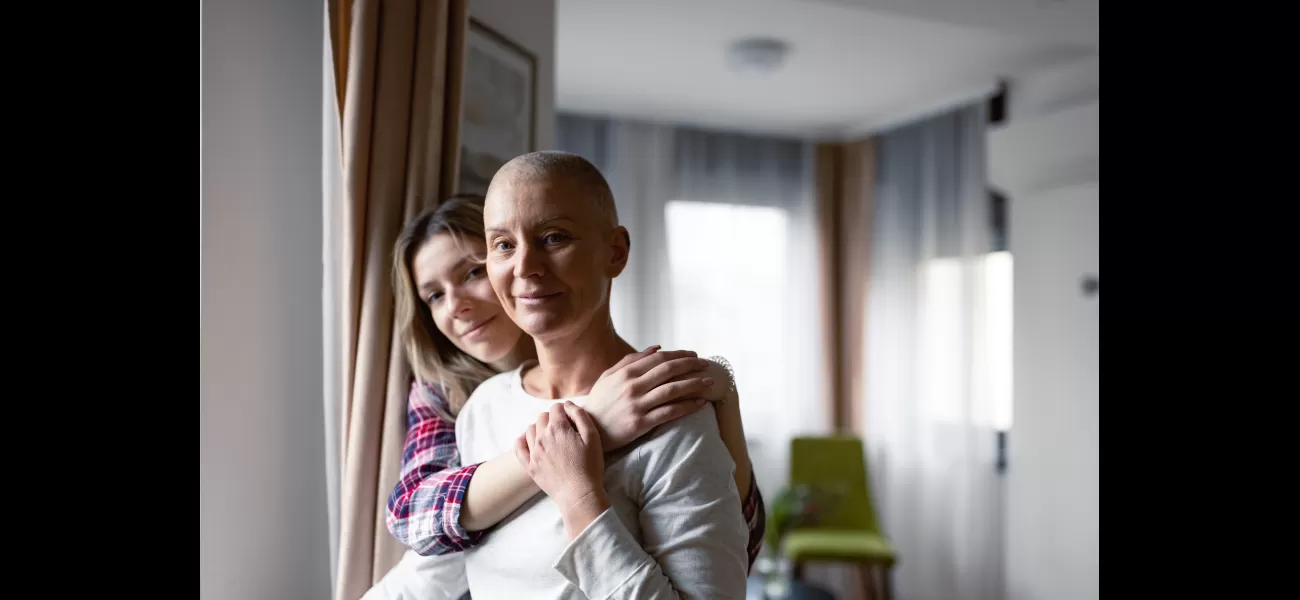Learn to recognize and act on early warning signs of cancer.
Be proactive in detecting cancer by recognizing symptoms and seeking medical attention. Unsure of what to watch for?
March 14th 2024.

Help the NHS Help You: Identifying the Early Signs of Cancer
It's important to be vigilant when it comes to our health, especially when it comes to cancer. But what exactly should we be looking out for? Michael Sloane, a 68-year-old accountant from High Wycombe, Buckinghamshire, found out the answer to this question in a rather unexpected way.
After a rigorous workout at an outside gym on the beautiful Dorset coast during his holiday, Michael treated himself to a nice coffee. But when he went to the bathroom afterwards, he noticed that his urine was the color of rosé wine instead of the usual color. "I thought that was a bit unusual, but perhaps I'd overdone things at the gym," he recalls.
A few days later, the same thing happened again. This time, Michael knew something wasn't right and decided to book an appointment with his GP. "She was very good and ordered various tests, including blood and urine tests," he explains.
These tests revealed a tumor in Michael's bladder, which came as a shock to him. He had surgery to remove the mass and has since had two more operations to remove new tumors that were detected during regular follow-ups over the past decade. Thanks to his instinct and early diagnosis, Michael's outcome could have been very different.
It's important to trust your instincts and take action if you suspect something is wrong with your body. This is because early diagnosis and prompt treatment are key to surviving cancer. And who knows your body better than you?
The thought of seeking treatment can be daunting, and many of us tend to put it off because the idea of being seriously ill and needing invasive treatment is scary. However, we shouldn't let our fears hold us back from taking action. The good news is that while the number of cancer diagnoses is on the rise, so is the survival rate. In fact, half of us are now expected to live for at least a decade after being diagnosed with cancer.
That's why it's important to see your GP if you feel that something is not quite right. They will be able to refer you for further tests, which are more likely to rule out cancer than confirm a diagnosis. And if the news isn't good, your GP will be there to support you and provide you with the necessary treatment.
Professor Peter Johnson, NHS England's National Clinical Director for Cancer, emphasizes the importance of recognizing changes in your body and taking action. "Cancer symptoms and early warning signs can be very varied, with some being less obvious than others," he says. "But what's important is to know what's normal for you so that you can spot any changes. If you have any concerns or if something in your body doesn't feel quite right, you should contact your GP practice. It could be nothing, but diagnosing cancer earlier could save your life."
Listening to your body is crucial, especially since some cancer symptoms are so common that they can easily be dismissed as unimportant. Gill Winsor, a 64-year-old delivery driver from Essex, learned this firsthand when she was diagnosed with acute myeloid leukemia (AML).
It all started when Gill noticed that she was getting out of breath while running with her daughter. She initially attributed it to getting older and not going to the gym as much. But then she developed a long lump in her groin, which continued to grow.
Her GP first diagnosed her with an infection, then a hernia. But when a scan showed an enlarged lymph node and a blood test revealed anemia, Gill was sent to the emergency room. She had a bone marrow biopsy, which confirmed the diagnosis of AML.
Looking back, Gill realizes that she had been experiencing symptoms such as fatigue, joint pain, and infections for a while, but she didn't know that they were related to her cancer. She underwent treatment at St Bartholomew's Hospital in London, which included chemotherapy tablets and a stem cell transplant from a donor in the United States.
Throughout her treatment, Gill remained positive and refused to let her illness consume her. "It often seemed like a bit of a dream because I didn't feel that ill," she says. "But if I'd left it, I probably wouldn't be here now." Gill's story is a testament to the importance of early diagnosis and prompt treatment in cancer survival. So if you notice any changes in your body, trust your instincts and seek medical attention. It could save your life.
Help the NHS to help you: It's important to pay attention to your body and recognize the signs of cancer early. This is a lesson that Michael Sloane learned when he noticed a change in his urine color after a rigorous workout. At first, he brushed it off as a result of his intense exercise, but when it happened again, he knew something wasn't right. Trusting his instincts, he promptly booked an appointment with his GP and underwent various tests, which led to the shocking discovery of a tumor. Thanks to his quick action, the tumor was removed and Michael has since had two more operations for new tumors that were detected during regular check-ups.
This experience highlights the importance of early diagnosis and prompt treatment when it comes to cancer. As scary as the thought of seeking treatment may be, it is crucial in increasing the chances of survival. In fact, cancer survival rates have doubled in the past 40 years, with half of all diagnosed individuals expected to live for at least 10 years. This is why it's important to take action and see your GP if you suspect something is wrong with your body, as early diagnosis can save lives.
Each person's body is unique and it's important to pay attention to any changes that may occur. This is especially true for signs of cancer, as they can often be dismissed as common symptoms of everyday life. For example, Gill Winsor initially brushed off her breathlessness while running as a result of getting older and not going to the gym as much. However, when she also noticed a long lump in her groin and other seemingly unrelated symptoms, she decided to seek medical attention. Through various tests and a bone marrow biopsy, she was diagnosed with acute myeloid leukaemia. Fortunately, she received prompt treatment and is now in remission.
It's important to know your body and recognize any changes that may occur, as some cancer symptoms can be less obvious than others. If something doesn't feel quite right, it's always best to consult with your GP. They will be able to perform tests and determine whether further action is needed. Remember, diagnosing cancer early can be life-saving.
Gill's story also highlights the importance of listening to your body and trusting your instincts. Even though she didn't know the symptoms of leukaemia, she recognized that something was wrong and sought medical attention. Her determination to stay positive and not dwell on her illness also played a significant role in her recovery. If she had ignored her symptoms and delayed seeking treatment, the outcome could have been very different.
In conclusion, it's important to be aware of the signs of cancer and take action if something doesn't feel right. The NHS is there to help you, and early diagnosis and prompt treatment can make all the difference in the fight against cancer. Trust your body and trust your instincts - they could save your life.
It's important to be vigilant when it comes to our health, especially when it comes to cancer. But what exactly should we be looking out for? Michael Sloane, a 68-year-old accountant from High Wycombe, Buckinghamshire, found out the answer to this question in a rather unexpected way.
After a rigorous workout at an outside gym on the beautiful Dorset coast during his holiday, Michael treated himself to a nice coffee. But when he went to the bathroom afterwards, he noticed that his urine was the color of rosé wine instead of the usual color. "I thought that was a bit unusual, but perhaps I'd overdone things at the gym," he recalls.
A few days later, the same thing happened again. This time, Michael knew something wasn't right and decided to book an appointment with his GP. "She was very good and ordered various tests, including blood and urine tests," he explains.
These tests revealed a tumor in Michael's bladder, which came as a shock to him. He had surgery to remove the mass and has since had two more operations to remove new tumors that were detected during regular follow-ups over the past decade. Thanks to his instinct and early diagnosis, Michael's outcome could have been very different.
It's important to trust your instincts and take action if you suspect something is wrong with your body. This is because early diagnosis and prompt treatment are key to surviving cancer. And who knows your body better than you?
The thought of seeking treatment can be daunting, and many of us tend to put it off because the idea of being seriously ill and needing invasive treatment is scary. However, we shouldn't let our fears hold us back from taking action. The good news is that while the number of cancer diagnoses is on the rise, so is the survival rate. In fact, half of us are now expected to live for at least a decade after being diagnosed with cancer.
That's why it's important to see your GP if you feel that something is not quite right. They will be able to refer you for further tests, which are more likely to rule out cancer than confirm a diagnosis. And if the news isn't good, your GP will be there to support you and provide you with the necessary treatment.
Professor Peter Johnson, NHS England's National Clinical Director for Cancer, emphasizes the importance of recognizing changes in your body and taking action. "Cancer symptoms and early warning signs can be very varied, with some being less obvious than others," he says. "But what's important is to know what's normal for you so that you can spot any changes. If you have any concerns or if something in your body doesn't feel quite right, you should contact your GP practice. It could be nothing, but diagnosing cancer earlier could save your life."
Listening to your body is crucial, especially since some cancer symptoms are so common that they can easily be dismissed as unimportant. Gill Winsor, a 64-year-old delivery driver from Essex, learned this firsthand when she was diagnosed with acute myeloid leukemia (AML).
It all started when Gill noticed that she was getting out of breath while running with her daughter. She initially attributed it to getting older and not going to the gym as much. But then she developed a long lump in her groin, which continued to grow.
Her GP first diagnosed her with an infection, then a hernia. But when a scan showed an enlarged lymph node and a blood test revealed anemia, Gill was sent to the emergency room. She had a bone marrow biopsy, which confirmed the diagnosis of AML.
Looking back, Gill realizes that she had been experiencing symptoms such as fatigue, joint pain, and infections for a while, but she didn't know that they were related to her cancer. She underwent treatment at St Bartholomew's Hospital in London, which included chemotherapy tablets and a stem cell transplant from a donor in the United States.
Throughout her treatment, Gill remained positive and refused to let her illness consume her. "It often seemed like a bit of a dream because I didn't feel that ill," she says. "But if I'd left it, I probably wouldn't be here now." Gill's story is a testament to the importance of early diagnosis and prompt treatment in cancer survival. So if you notice any changes in your body, trust your instincts and seek medical attention. It could save your life.
Help the NHS to help you: It's important to pay attention to your body and recognize the signs of cancer early. This is a lesson that Michael Sloane learned when he noticed a change in his urine color after a rigorous workout. At first, he brushed it off as a result of his intense exercise, but when it happened again, he knew something wasn't right. Trusting his instincts, he promptly booked an appointment with his GP and underwent various tests, which led to the shocking discovery of a tumor. Thanks to his quick action, the tumor was removed and Michael has since had two more operations for new tumors that were detected during regular check-ups.
This experience highlights the importance of early diagnosis and prompt treatment when it comes to cancer. As scary as the thought of seeking treatment may be, it is crucial in increasing the chances of survival. In fact, cancer survival rates have doubled in the past 40 years, with half of all diagnosed individuals expected to live for at least 10 years. This is why it's important to take action and see your GP if you suspect something is wrong with your body, as early diagnosis can save lives.
Each person's body is unique and it's important to pay attention to any changes that may occur. This is especially true for signs of cancer, as they can often be dismissed as common symptoms of everyday life. For example, Gill Winsor initially brushed off her breathlessness while running as a result of getting older and not going to the gym as much. However, when she also noticed a long lump in her groin and other seemingly unrelated symptoms, she decided to seek medical attention. Through various tests and a bone marrow biopsy, she was diagnosed with acute myeloid leukaemia. Fortunately, she received prompt treatment and is now in remission.
It's important to know your body and recognize any changes that may occur, as some cancer symptoms can be less obvious than others. If something doesn't feel quite right, it's always best to consult with your GP. They will be able to perform tests and determine whether further action is needed. Remember, diagnosing cancer early can be life-saving.
Gill's story also highlights the importance of listening to your body and trusting your instincts. Even though she didn't know the symptoms of leukaemia, she recognized that something was wrong and sought medical attention. Her determination to stay positive and not dwell on her illness also played a significant role in her recovery. If she had ignored her symptoms and delayed seeking treatment, the outcome could have been very different.
In conclusion, it's important to be aware of the signs of cancer and take action if something doesn't feel right. The NHS is there to help you, and early diagnosis and prompt treatment can make all the difference in the fight against cancer. Trust your body and trust your instincts - they could save your life.
[This article has been trending online recently and has been generated with AI. Your feed is customized.]
[Generative AI is experimental.]
0
0
Submit Comment





